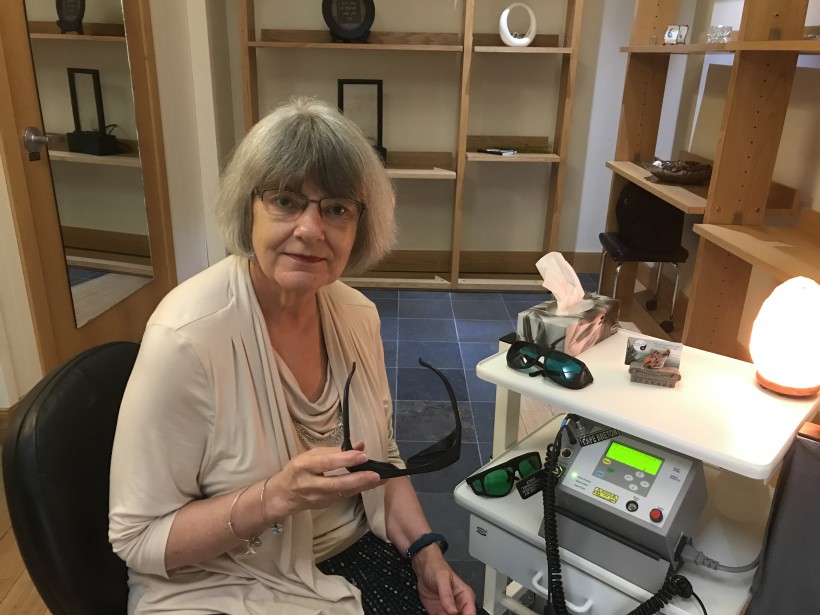A retired physiotherapist from New Waterford, Cape Breton, is the driving force behind a project to create a device that can prevent such conditions as jet-anxiety, motion sickness, and even hangovers.
Joan Chiasson-MacDonald operates Yin and Yang Wellness at Halifax’s Stanfield International Airport, and has partnered with Dalhousie University researchers and Cape Breton IP specialist Rob MacKenzie on new patentable technology. They are developing a chair that will use light-based acupuncture to help prevent conditions ranging from jet-lag to sea sickness.
“I think it would be great to have the service available everywhere,” said Chiasson-MacDonald in an interview. “I think people all over the world should be able to access this service. Why should anyone suffer jetlag?”
Chiasson-MacDonald spent 41 years as a physiotherapist, most of it with her own practice in New Waterford. During the last decade there, she used laser acupuncture in various ways, including to help people stop smoking. Though most of us think of acupuncture as inserting needles into certain nerves, lasers can also be used to activate acupuncture points.
Eventually, she began to use laser acupuncture to treat hangovers and cure anxiety. Then she started using it as a preventive tool, and found that the procedure could ward off hangovers, anxiety, jet-lag, motion sickness and other afflictions for as long as two weeks. (You read that right: a preventive cure for hangovers.) The Yin and Yang Wellness website features 25 testimonials from people who use the service for such things as hangover prevention.
“Joan’s hangover laser points give you the opportunity to have fun, play hard (if you want to), and not spend the next day with a headache, or sick in bed,” writes one customer who identifies herself as Heather M. “I would not travel without seeing Joan first.”
Now Chiasson-MacDonald wants to move on to something more innovative. Recent research by the National Aeronautics and Space Administration, or NASA, has shown that LED lighting can also activate acupuncture points, just like lasers do.
Chiasson-MacDonald said this is important because laser acupuncture poses a danger: it can damage the eye if the beam hits the eyeball. People having the procedure have to wear goggles. LED light would be completely safe. Chiasson-MacDonald and MacKenzie, who heads Aramax IP Services in Edwardsville, are developing a chair with armrests that would emit LED rays into the forearm. The chair could sit unattended in a public spot like an airport, and people could pay with a credit card to get treatment to prevent jet-lag, anxiety or other problems.
They are working with Matt d’Entremont at the Nova Scotia Product Design and Development Centre at Dalhousie for the initial work, and expect to have a prototype ready early in 2020. They admit it would take capital to roll out the project, but for now they want the prototype to validate the concept.
For the time being, Chiasson-MacDonald is working on her retail operation in the lobby of the airport. Business is slow but she hopes it will improve once word gets out that you can prevent hangovers, motion sickness and jet-lag with just a few minutes of laser therapy.
“Being at the airport right now, I think I’m in the right place but the locals don’t know me and the visitors don’t know me,” she said. “I think that once people learn about it, it will work out.”










